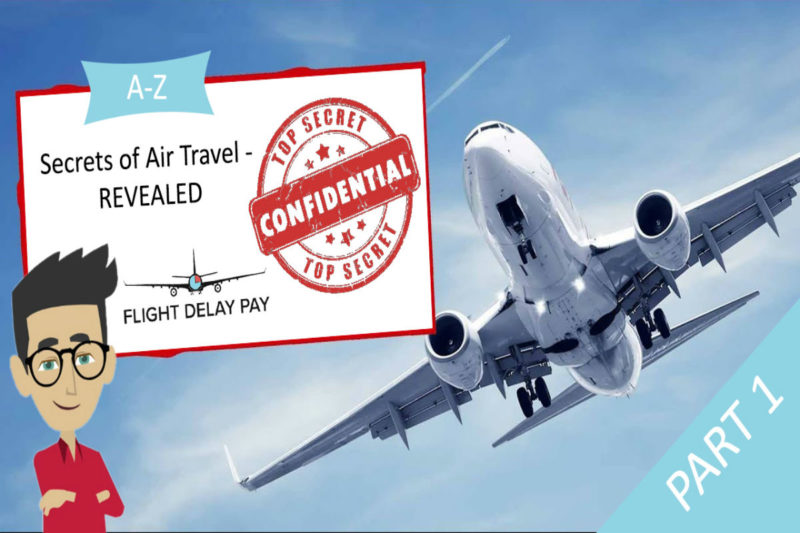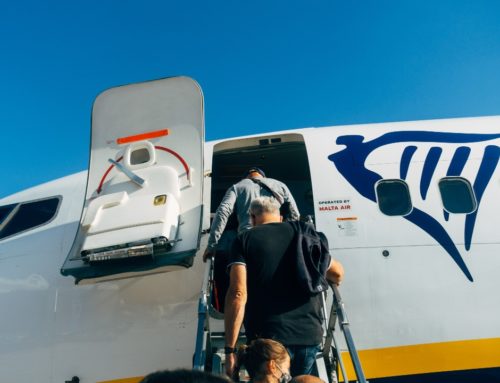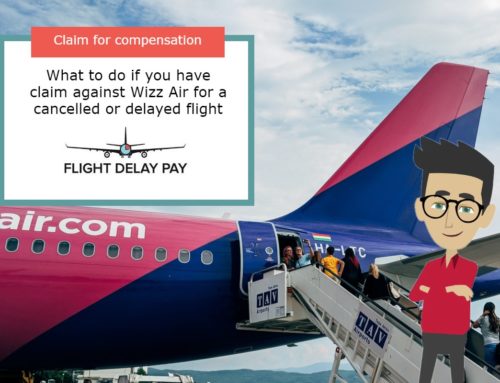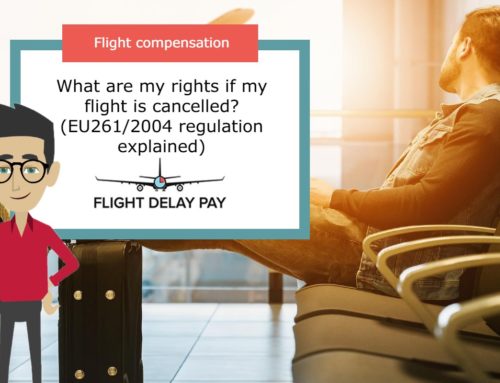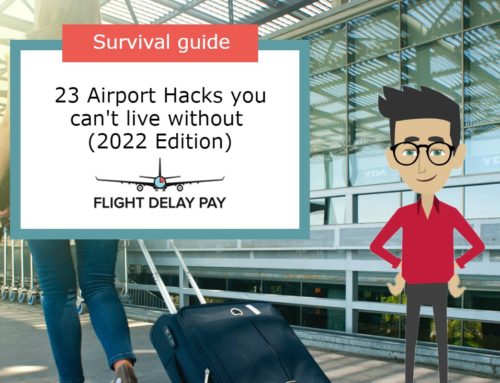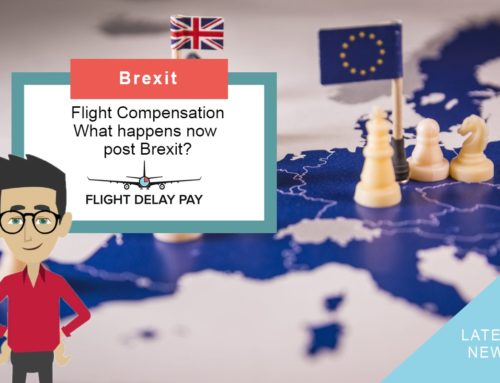Secrets of Air Travel Revealed. Have you ever wondered if there are certain secrets airlines don’t tell you? Commercial air travel has long been a breeding ground for secrets, myths, and urban legends. Flight Delay Pay reveals all in the first of a two-part blog series.
For so many of us, traveling by plane is becoming as routine as taking a train or bus. It’s the safest form of travel. It feels like there are no air travel secrets left for us frequent fliers. We know everything right? Long security lines, duty-free, cramped departure gates and of course delays and cancellations (We can help you with those!) on flights. It’s all part of air travel.
According to the Eurostat, in 2016, the total number of passengers travelling by air in the EU was approximately 973 million with numbers peaking at 10,000 aircraft in the air around the world at any one given time (FlightAware) – that’s a lot of people and planes! But the numbers don’t tell the whole story. The flight attendants who work on the flights do.
We’ve trawled the Internet, including the wonderfully weird world of Reddit and extracted out accounts from real flight attendants who work for real major airlines. We’ve found answers to the questions you’ve always wanted answering. There are some really interesting, scary and bizarre revelations.
Part 1 lists A through to L.
#A is for AIRLINES manipulate flight times
In order to increase their on-time flights efficiency, airlines have changed the time needed to make a certain trip.
While denied by the airlines, that’s what a AirTran Airways pilot told Reader’s Digest Magazine in 2013.
“No, it’s not your imagination: Airlines really have adjusted their flight arrival times so they can have a better record of on-time arrivals,” he said. “So they might say a flight takes two hours when it really takes an hour and 45 minutes”
Recent research support this claim. It revealed that flight times have increased across the board in recent years.
Take, for example, the short hop from London Heathrow to Edinburgh. In 1996 every flight heading north was allotted a block of 75 minutes or less. However, by 2015, the majority of airlines now expect to take 85 minutes. It’s called “schedule padding”.
#B is for – Does the BRACE position save lives?
The Conspiracy theory radar is going berserk with this one. Numerous theories have been proposed about the purpose of the procedure. Some have suggested that it is only useful for preserving passengers’ teeth, allowing for easier identification (using dental records) after a crash. Lovely. Another is that the position actually increases the chance of death, by breaking your neck, and is subsequently recommended by airlines to reduce medical insurance costs, or, to the more morbid, to ensure a quick and painless death. Lovely.
Everyone is in one camp. But which one is true?
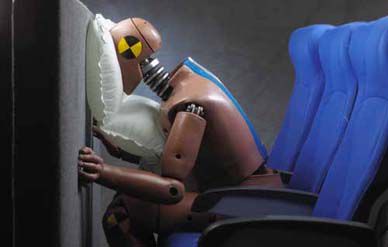
Source: Air & Space Magazine
Steve Allright, a British Airways training captain, insists that the brace position currently used by airlines has saved lives.
“Flying is one of the safest forms of transport,” he said. “The need to use the brace position is incredibly rare. However, it is a globally recognised safety technique.
“The last major refinement to the brace position in Britain was introduced following research into cabin safety after the Kegworth crash in 1989, which studied the resulting injuries from those who did and did not adopt the brace position.”
A 2012 Channel 4 programme saw a real passenger jet deliberately crashed into the Sonoran Desert in Mexico. Three dummies on board were arranged in various positions: one in the classic “brace” position and with a seat belt fastened, one with just the seat belt fastened, and a third with neither. Experts concluded that the dummy in the brace position with its seat belt fastened would have survived the impact. The one which was not in the brace position would have suffered severe head injuries, while the one not wearing a seatbelt would have died.
Case closed, right?
#C is for – Never drink the COFFEE
Prepare to wretch. This one is wrong.

Source: ImgFlip
Best avoid having a brew when on a plane. Just saying…
“The coffee is absolutely disgusting because no one washes the container that goes out every morning,” according to WorseToWorser. “The station agents who get paid way too little don’t give a sh*t about cleaning it. I certainly didn’t when I worked for AA. Also, because we weren’t given the proper supplies to clean it. We pretty much just rinsed it out and dumped coffee into it.”
“Sometimes, the vehicle that fills the potable water for washing hands and making coffee is parked next to the vehicle that is used to dump the shitters and fill the blue juice for the lavs,” added Mudbutt7. “They’re not supposed to. Sometimes, they’re parked at a distance from each other, which is policy, yet the guy who is filling the water is using gloves that he hasn’t changed in over two years.”
“I wouldn’t recommend drinking coffee or hot tea from the plane. It’s made with the potable water and those tanks are rarely cleaned out. None of the crew drink it.”
Roni Faida Clarke, Ramp Agent and travel blogger at Ronithetravelguru.com
Steer clear of tap water too. Airplane water tanks are notoriously hard to clean, so even when they are flushed with disinfectant, most bacteria stays in the tank. Ask for bottled water instead. Better than blowing chunks on a 12-hour flight!
#D is for – DO Planes DUMP Fuel (and other things) whilst in the air?
Do planes dump fuel?
Yes.
Why is it considered permissible, let alone smart? It seems that it would be too dangerous to release fuel lest it cause a fire in the aircraft. And should we pull out our umbrellas when a plane goes over, just in case it starts raining gasoline?
Generally, fuel dumping happens at a high enough altitude for it to dissipate – it doesn’t reach the ground in liquid form or come raining down on people. It sounds terrible but one way or another that fuel is going into the atmosphere.
Fuel is stored in the wings of a plane and is jettisoned from small nozzles also located in the wings. The pilot typically goes through a three or four step process to engage the plumbing and start dumping fuel.
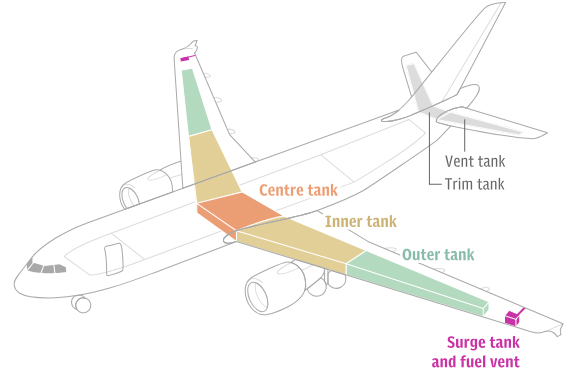
What about when you flush the loo?
There is no way to jettison the contents of the lavatories during a flight,” explains Patrick Smith, a pilot and author of Cockpit Confidential, a book about air travel. “At the end of a flight, the blue fluid, along with your contributions to it, are vacuumed into a tank on the back of a truck. (The truck driver’s job is even lousier than the co-pilot’s, but it pays better.)
It is impossible to empty passengers’ waste from an aircraft intentionally, but not by mistake.
“A man in California once won a lawsuit after pieces of blue ice fell from a plane and came crashing through the skylight of his sailboat,” added Captain Smith. “A leak, extending from a toilet’s exterior nozzle fitting, caused runoff to freeze, build, and then drop like a neon ice bomb. If you think that’s bad, a 727 once suffered an engine separation after ingesting a frozen chunk of its own leaked toilet waste, inspiring the line ‘when the s*** hits the turbofan.’”
#E is for ECONOMY seats are safer
Which is the safest seat on an aircraft? Well, all you eagled eye readers will notice the subtle hint in the title.
The logically answer is seats over the wing of an aircraft – where the plane is “the strongest”. However several studies prove otherwise.
The producers of the Channel 4 documentary, The Crash (yep, that programme again – defo worth a watch), arranged for a Boeing 727 carrying cameras, sensors and crash test dummies with breakable “bones” to be deliberately crashed into the Sonoran Desert in Mexico.
After hitting the ground, the front of the plane and the first 11 rows of seats – usually reserved for first-class, business-class or premium-economy passengers – were ripped off. Experts concluded that none of the plane’s first-class passengers would have survived, but 78 per cent of the other passengers would have, with the chance of survival increasing the closer they were sitting to the rear of the aircraft. According to a survey by sunshine.co.uk, the results of the study led to a sharp fall in the number of enquiries for first-class seats.
Flying is very safe. The odds of being killed on a single flight are 1 in 4.7 million, according to the website (perhaps the winner of most morbid too) planecrashinfo.com. But you might raise that figure slightly by sitting in economy class, in the middle row, with your seat belt fastened, by the window, within a few rows of an emergency exit.
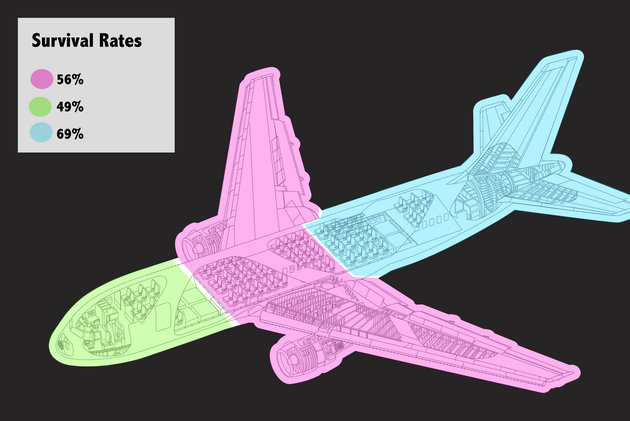
Source: Popular Mechanics
#F is for your FLIGHT ATTENDANT could probably deliver your baby
Flight attendants aren’t just waiters in the sky – they have some serious credentials. Training to be a flight attendant involves a host of technical and safety know-how.
As flight attendant Carrie A. Trey told The Points Guy, “practical tests can include learning how to put out fires via simulators, diagnosing various conditions, splinting broken limbs, stopping nosebleeds, administering CPR, and yes, even baby delivery.”
When babies are born on international flights, determining citizenship can be quite a tricky matter. Usually, the child will be accorded the citizenship of one or both of its parents. Some countries, including the US, will also grant citizenship to a baby that is born within national airspace. Additionally, 70 countries have ratified or acceded to the UN Convention on the Reduction of Statelessness, which says that a baby born on an aircraft is entitled to citizenship in the country where the plane is registered, but only if that baby would otherwise be “stateless.” Perhaps out of gratitude for the positive news coverage they bring for air carriers, some (though not all) babies born in flight have received perks from the airline where they made their debuts—including scholarships and free flights.
#G is for Airplane Trays are really GROSS
If you’re inclined towards cleanliness, it may be best to take some antibacterial wipes on flights, so you can give the tray tables a good scrub – they’re regarded as the muckiest part of a plane after travel website TravelMath.com sent a microbiologist to take samples from four flights and five airports.

Source: Airline Hygiene Exposed @ TravelMath.com
#H is for What is the HOOK on the wing for?
In most planes, to use an emergency exit slide, passengers have to step onto a smooth and slippery wing. To make this easier, a special hook was designed: a safety rope is led through it, with one end attached to the door and the other hooked to the wing at the base of the slide. Holding on to the rope, passengers can safely evacuate.
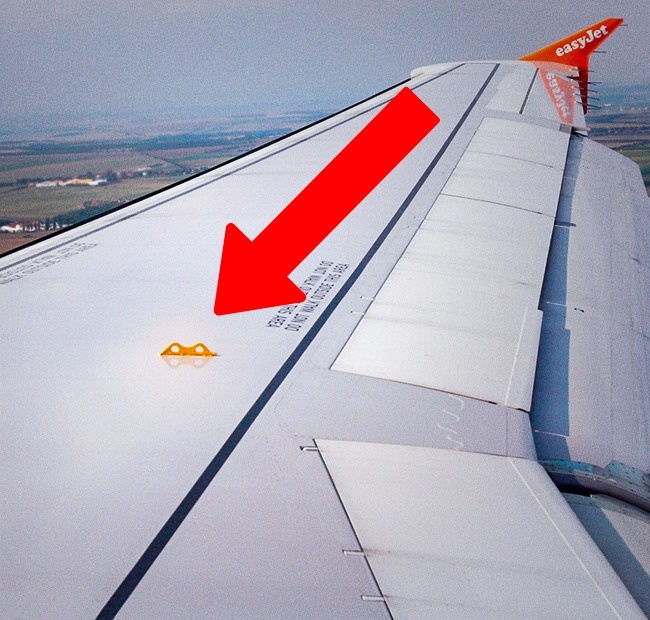
© anizza/depositphotos.com
#I is for IN-FLIGHT food tastes bad for a reason
Gordon Ramsay would never eat airplane food. Our **Bleep man** is primed…okay…Gordon go!
“There’s no f–king way I eat on planes,” Ramsay, known for his Michelin-starred restaurants and explosive television personality, told Refinery29 earlier this year. “I worked for airlines for 10 years, so I know where this food’s been and where it goes, and how long it took before it got on board.”
Thanks Gordon.
It’s not the food that’s to blame. Not entirely…
Although planes generally cruise at altitudes of about 40,000 feet, air pressure in cabins is about 6,000 to 8,000 feet above sea level, making it difficult to prepare fresh meals onboard. Prior to takeoff, airlines freeze pre-made meals on the ground and thaw them out while in the air.
The combination of dry air, low pressure and loud engine noises in flight cabins heavily impact the passengers’ ability to smell and taste — causing even the best-prepared food to seem slightly off.
The dry air of a flight cabin tends to suppress our sense of smell, which is an important factor in taste. Low air pressure and background noises further impact the way we taste, by repressing the ability to taste sweet and salty foods. For food to taste the same before it is in the air, airline caterers have to add up to 30% more of sugar or salt to a meal.

Source: Know Your Meme
#J is for know your Pilot JARGON
If you’ve ever boarded a flight and listened to your Captain speaking, the following thought may have crossed your mind – ‘Are they speaking a foreign language?’ The answer is, sort of! Pilots need to have excellent communication skills, especially when using voice procedures by radio, so while the words may sound odd to us, pilots are speaking an international ‘aviation language’.
Roger:
“I have received all of the last transmission”. Originating from the phonetic alphabet, during the time period when the radio was first invented – “Roger” was used for the letter “R”. While the modern alphabet now uses “Romeo” for the letter “R”, Roger is now a crucial word used in pilot lingo.
Wilco:
Wilco means – “I will comply”, meaning that the speaker will follow the instructions to which they are replying. Unlike term “Roger” where pilots confirm they have received all of the last transmission, “Wilco” means that the message has been received, understood, and will be complied with.
Standby:
Standby means – “pause for the next transmission”. Essentially the controller is telling pilots “I’ll get back to you in a minute”. Many pilots will spend hours debating whether a response to “standby” is necessary. While some pilots will often respond back to the controller with a “standing by” and their identification number, many others will sit silently waiting for the next response from the controller. If the airport is very busy, some pilots will double click their responder, as a response to signify that they have received the transmission, while others believe a double click response is rude.
Squawk:
“Call sign squawk ident”. A squawk code is a discrete transponder code. Air traffic controllers will use the term “squawk” when requesting a pilot to identify their airplane on the air traffic control radar. Pilots will push a button on their transponder to show their location and become correctly associated with their identity.
Over and out:
You may have heard the term “over and out” used in movies often; however, this is one term you will not hear your pilot say! “Over” means “end of transmission, expect response” when used in aviation, while “out” means “end of transmission, not expecting response”. This means that the words “over and out” are not only incredibly confusing, but negate one another. Both the term “over” and “out” are used very rarely in aviation, instead “roger” or “wilco” is a far better response.
Source: Soar Aviation
#K is for KINDNESS will get you everywhere
Being nice never hurts in life, but on a plane it could make the difference between a miserable long-haul flight and a journey that quite literally flies by. If you like the sound of being furnished with First Class treats like a cappuccino or a cheese platter, start by sweet-talking the steward. No guarantees of course, but you’re much more likely to win favours by making their job easier vs. being that Annoying Passenger in Seat 38.
The nicer you are to us, the more we can do for you. Ran out of beef? Ask politely and we will get you a fillet mignon from first class. Your neighbour is noisy? Tell us nicely and we might be able to get you a better seat. You’re 35k feet in the air but you’d like to know the results of the game? Be nice and we can send a message to ground and ask. More often than not when passengers are aggressive and nasty we’d render minimal service and not extend more help than need be.
Be nice to the ticket agent and they will pretty much always let you get away with overweight bags. If you were funny, I’d even not charge you for bags.
via Reddit
#3 The first offense one flight attendant mentions is taking forever to decide what beverage you’d like.
#2 Airline workers hate it when people try to get a jump on the other passengers at the end of the flight. It may be super tempting to unbuckle and go for your overhead luggage while the plane is taxiing to the terminal, but that’s also a great way to earn the undying enmity of your flight crew.
#1 Last but not least, stretching out that final phone call before the flight can really irritate the folks who are there to keep you safe and comfortable until you touch down at your final destination. One airline admitted to nearly losing their cool when passengers remain on the phone after being told to put their devices in airplane mode.
Sources: MIC, SkyScanner, FashionBeans
#L is for the LAVATORY is never LOCKED
You can manually open the lavatory doors on planes from the outside without any external aid. Simply slip a fingernail underneath the edge of the lavatory sign and slide the knob to unlock the door.
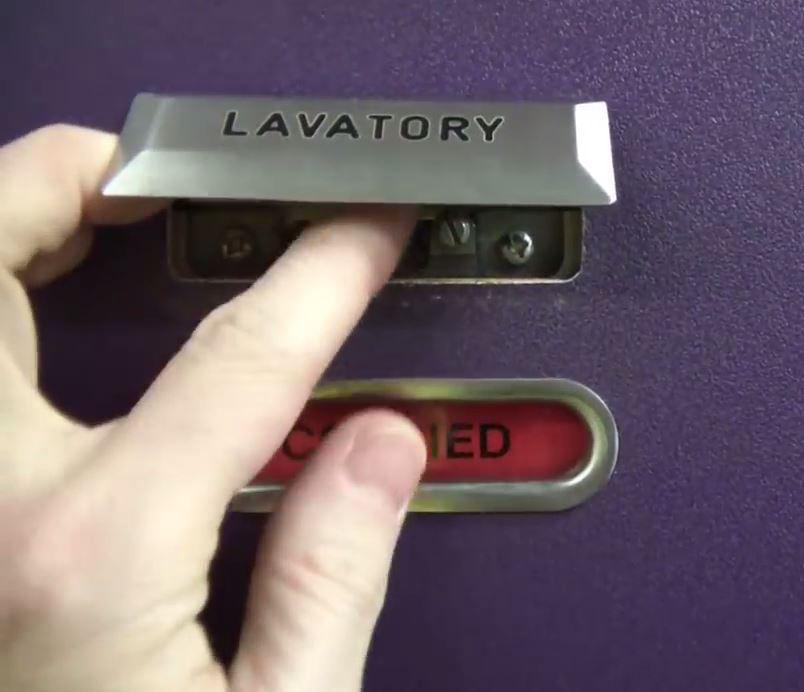
Source: The Sun
The Latch has its benefits – it allows cabin crew to get inside the toilet if someone is suffering from health problems.
It also means a parent can release a young child if they accidentally lock themselves in.
However – for amorous couples attempting to join the Mile High Club, the overriding lock means that they could be rudely interrupted by a flight attendant at any given time.
The Best Kept Secret of all? You have rights – know them!
Wherever you are in the world, did you know that you have special passenger rights for air travel? If you were on a flight in the last 6 years that was delayed over 3 hours or cancelled; or if you were denied boarding, the airline may owe you money. Up to the tune of up to €600, depending on the length and severity of your disruption.
Each year it is estimated that over 30 million European air passengers suffer from flight delays and cancellations and only 9% are aware of their rights. Since 2004, European airline companies need to financially compensate air passengers in accordance with regulation EC 261/2004.
Got Delayed? Get Paid
We know that it can be difficult for consumers to get the compensation they are entitled to. This is where we come in. Flight Delay Pay is a team of travel and legal professionals with vast knowledge and many years of experience working with European Passenger Rights. We strive to make claims for compensation as easy as possible and achievable for everyone. We make a complicated process hassle free and communicate with airlines on your behalf. We understand your pain, so let us take the strain and handle your claim. No win, no fee!
Head over to our Start a Claim page to find out more

